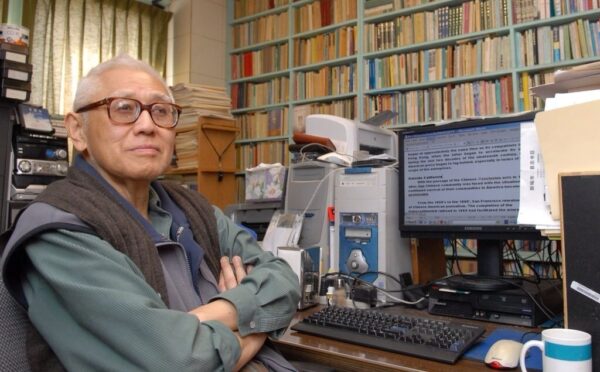
Courtesy Chinese Historical Society of America
The dean of Chinese American history, Him Mark Lai passed away on May 21, 2009. Proud of working outside academic history, Him Mark was prodigious in the recovery and interpretation of primary materials and won the respect, affection, and gratitude of scholars internationally. The archive he collected and donated to the Ethnic Studies Library at the University of California (UC), Berkeley, extends to more than 200 feet.
Him Mark (Mai Liqian 麥禮謙) was born in San Francisco in 1925 to immigrants from Guangdong. His first language was Cantonese, but he eventually mastered English well enough to study mechanical engineering at UC Berkeley. He loved reading history but opted for a safer career route and worked for Bechtel until retiring in 1984.
Him Mark’s “nonprofessional” passions also constitute his legacy. In the thick of Cold War anticommunism, he helped lead the left-wing Chinese American Youth Club, Mun Ching, a youth organization fostering interests in the newly founded People’s Republic of China. His wife, Laura Yuk-Ying Jung, shared his values, and they remained devoted partners and intellectual collaborators their entire lives.
Him Mark’s intellectual curiosity led him to take night classes in the 1960s, when textbooks neglected or distorted Chinese American experiences. Inspired by the people and community he lived among, he began researching Chinese American history. He co-authored the still indispensable A History of the Chinese in California: A Syllabus (Chinese Historical Society of America [CHSA], 1969) and after the 1968–69 Third World student strikes at San Francisco State University (SFSU) co-taught the first Chinese American history college course in the country.
Him Mark produced or edited about a dozen books and 200 articles and essays. He and Laura traveled the country visiting university and community libraries and archives, where he uncovered invaluable Chinese-language sources. His fluency in written Chinese and spoken Cantonese opened new vistas into history. This research led to publications like Chinese Newspapers Published in North America, 1854–1975 (1977, compiled with Karl Lo) and A History Reclaimed: An Annotated Bibliography of Chinese Language Materials on the Chinese of America (1986). Many of his interviews with community elders appear in the much-reprinted Island: Poetry and History of Chinese Immigrants on Angel Island (1980, edited with Genny Lim and Judy Yung). Him Mark gained the trust of community members, some of whom granted him unprecedented access to organizational records that enabled him to publish A History of the Sam Yup Benevolent Association in the United States, 1850–1974 (1975).
Sadly, Him Mark’s passing prevented him from completing the translation of his magisterial Cong Huaqiao dao Huaren: Ershi shiji Meiguo Huaren shehui fazhan shi (From overseas Chinese to Chinese America: A history of the development of Chinese American society during the twentieth century) (Joint Publishing Company, 1992). Academic presses published his English-language scholarship, including Becoming Chinese American: A History of Communities and Institutions (AltaMira Press, 2004); Chinese American Voices: From the Gold Rush to the Present (Univ. of California Press, 2006, with Yung and Gordon H. Chang); Chinese American Transnational Politics (Univ. of Illinois Press, 2010, edited by Madeline Y. Hsu); and an autobiography completed days before his death: Him Mark Lai: Autobiography of a Chinese American Historian (UCLA Asian American Studies Center and CHSA, 2011, edited by Yung, Ruthanne Lum McCunn, and Russell C. Leong).
A pillar of the CHSA, he edited its journal, History and Perspectives; directed a community radio program; and co-led the In Search of Roots program, which featured genealogical research and visits to ancestral villages in the Pearl River delta for US-born youths. The program remains in operation and shaped many Chinese Americans’ understanding of their identities and history.
Although never holding a permanent academic position, he was professionally affiliated with programs at SFSU; UC Berkeley; the University of California, Los Angeles; and several Chinese institutions. He generously shared research materials and his knowledge and wisdom with anyone who sought him out. As he once wrote, Chinese Americans were “part of US history, Chinese history, and world history,” as his prodigious scholarly output has irrefutably demonstrated.
Gordon H. Chang
Stanford University
Madeline Y. Hsu
University of Maryland, College Park
This work is licensed under a Creative Commons Attribution-NonCommercial-NoDerivatives 4.0 International License. Attribution must provide author name, article title, Perspectives on History, date of publication, and a link to this page. This license applies only to the article, not to text or images used here by permission.